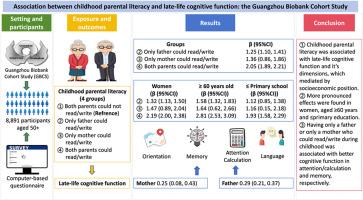Association between childhood parental literacy and late-life cognitive function: The Guangzhou Biobank Cohort Study
IF 3.9
3区 医学
Q1 PUBLIC, ENVIRONMENTAL & OCCUPATIONAL HEALTH
引用次数: 0
Abstract
Objectives
Evidence on the associations of childhood parental education with late-life cognitive function remains inconsistent. Additionally, studies focusing on dimensions of cognitive function are scarce, with none from China. Therefore, we examined the associations of childhood parental education with late-life cognitive function and it's dimensions and investigated potential interactions.
Study design
A cross-sectional study.
Methods
Participants were included from the third phase of Guangzhou Biobank Cohort Study. Mini-Mental State Examination (MMSE), Delayed 10-Word Recall Test (DWRT), and childhood parental literacy (could read or write) were collected. Multivariate linear and logistic regression were used.
Results
Among 8891 participants aged ≥50 years, compared with those whose childhood parents could not read/write, those with only the father, only the mother, or both parents able to read/write during childhood had higher scores on the MMSE and its dimensions, and lower odds of mild cognitive impairment (MCI). The coefficients (β) and 95 % confidence intervals (CI) for scores of MMSE were 1.25 (1.10, 1.41), 1.36 (0.86, 1.86), and 2.05 (1.89, 2.21) respectively; the odds ratios and 95 % CIs for MCI were 0.38 (0.33, 0.45), 0.35 (0.18, 0.67), and 0.15 (0.12, 0.19) respectively. More pronounced effects were found in women, those aged ≥60, those with ≤ primary education, and in those whose childhood parents could read/write. Socioeconomic position mediated the association. Cognitive functions of attention and calculation in children of only fathers who could read/write (β = 0.43, 95%CI: 0.35, 0.50) and memory in children of only mothers who could read/write (β = 0.34, 95%CI: 0.16, 0.51) were associated with better outcomes. Consistent results were also found using scores from the DWRT.
Conclusions
Childhood parental literacy was associated with late-life cognitive function and it's dimensions, which mediated by socioeconomic position. Specifically, having only a father or only a mother who could read/write during childhood was associated with better cognitive function in attention/calculation and memory, respectively. These results add new evidence to support strategies for elderly cognitive health care.

儿童时期父母识字与晚年认知功能之间的关系:广州生物库队列研究。
研究目的关于儿童时期父母教育与晚年认知功能关系的证据仍不一致。此外,以认知功能的各个维度为重点的研究也很少,其中没有一项研究来自中国。因此,我们研究了儿童时期父母教育与晚年认知功能及其各维度之间的关系,并调查了潜在的相互作用:研究设计:横断面研究:研究设计:横断面研究。方法:研究对象来自广州生物库队列研究第三期,收集了迷你精神状态检查(MMSE)、延迟 10 字回忆测试(DWRT)和儿童期父母识字率(会读会写)。采用多变量线性回归和逻辑回归:在 8891 名年龄≥50 岁的参与者中,与童年时父母不识字的人相比,童年时只有父亲、只有母亲或父母都识字的人在 MMSE 及其维度上得分更高,患轻度认知障碍(MCI)的几率更低。MMSE得分的系数(β)和95%置信区间(CI)分别为1.25(1.10,1.41)、1.36(0.86,1.86)和2.05(1.89,2.21);MCI的几率比和95%置信区间分别为0.38(0.33,0.45)、0.35(0.18,0.67)和0.15(0.12,0.19)。女性、年龄≥60 岁者、小学以下学历者和童年父母识字者的影响更为明显。社会经济地位是这种关联的中介。父亲识字的儿童在注意力和计算方面的认知功能(β = 0.43,95%CI:0.35,0.50)以及母亲识字的儿童在记忆方面的认知功能(β = 0.34,95%CI:0.16,0.51)与较好的结果相关。使用 DWRT 的得分也得出了一致的结果:结论:儿童时期父母的识字率与晚年认知功能及其各维度有关,而社会经济地位是其中介因素。具体来说,童年时期只有父亲或母亲识字与注意力/计算力和记忆力认知功能的提高有关。这些结果为老年人认知保健策略提供了新的证据。
本文章由计算机程序翻译,如有差异,请以英文原文为准。
求助全文
约1分钟内获得全文
求助全文
来源期刊

Public Health
医学-公共卫生、环境卫生与职业卫生
CiteScore
7.60
自引率
0.00%
发文量
280
审稿时长
37 days
期刊介绍:
Public Health is an international, multidisciplinary peer-reviewed journal. It publishes original papers, reviews and short reports on all aspects of the science, philosophy, and practice of public health.
 求助内容:
求助内容: 应助结果提醒方式:
应助结果提醒方式:


